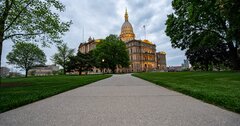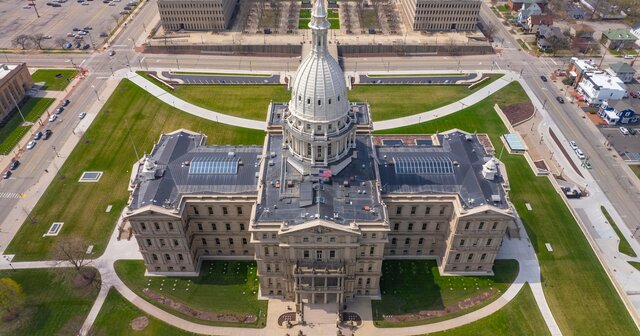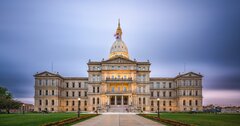

Michigan’s Republican majority House and Democratic majority Senate have not agreed on a lot this year. One of the things they will have to agree upon, however, is the state budget. An approaching deadline is making clear what each is fighting for.
The Senate passed a budget that increases state spending by $2.3 billion, 4.87% more than last year’s budget. It’s also more than the 3.64% recommended by the Mackinac Center’s Sustainable Michigan Budget, where we ask lawmakers to increase the budget by no more than the rate of inflation plus the rate of the state’s population growth.
The Senate-proposed spending levels are unsustainable for a simpler reason: After senators passed it out of the chamber, administrators updated revenue estimates and found they were not going to collect enough revenue to pay for all the spending.
The budget does call for a series of tax hikes. The costs to register boats would increase, and the optional state park admission fee would turn into a mandatory extra cost of registering vehicles.
The biggest spending increases are for schools ($1 billion) and Medicaid ($817 million). The school increase includes $350 million for school infrastructure needs. It’s based on a flawed study that didn’t even try to demonstrate that fixing school buildings required extra state revenue.
The budget also includes other grants to schools, with strings attached. But if these grants were for the priorities of school officials, schools could already use their unrestricted money. For instance, the budget extends $65 million in grants to get smaller class sizes in classrooms for students in kindergarten through third grade. It does this even when the statewide average class size is already down to 14, and there are better ways to improve education.
State spending on Medicaid is also going up. The number of people collecting benefits is going down, but the cost of care is increasing.
There’s also a couple hundred million in extra spending for pet projects in the Labor and Economic Opportunity budget.
The House of Representatives has not passed a budget yet. Appropriation Chair Ann Bollin has said she’s wanted to break the budget down to what is required and then set priorities from there. Residents will have to wait to see what lawmakers come up with.
House members have approved education funding bills. The bills replace many of the existing grants with per-pupil funding, without strings.
Outside of the budget, the House has not been silent on the rest of fiscal policy. The House passed a bill that would require lawmakers to publicly list a district grant request before it can be approved. That bill was approved with unanimous bipartisan support. It would also ask lawmakers to prove that their projects are not local ones or are expenditures that benefit private entities. Projects that bypass this test would avoid the two-thirds approval requirements the Michigan Constitution places upon district grant requests. That district grants are, in fact, subject to two-thirds approval is something we are trying to demonstrate in court.
Members of the House have also voted to reduce the income tax rate and to approve a road funding plan that redirects money away from ineffective business subsidies and toward road repair. All of this is easier to accomplish if lawmakers approve a budget that restrains spending.
There are some questionable spending items in the Senate budget, and the House has some good policy proposals that don’t show up in the budget. There are budget deadlines so residents will get to see.
Permission to reprint this blog post in whole or in part is hereby granted, provided that the author (or authors) and the Mackinac Center for Public Policy are properly cited.
Get insightful commentary and the most reliable research on Michigan issues sent straight to your inbox.



The Mackinac Center for Public Policy is a nonprofit research and educational institute that advances the principles of free markets and limited government. Through our research and education programs, we challenge government overreach and advocate for a free-market approach to public policy that frees people to realize their potential and dreams.
Please consider contributing to our work to advance a freer and more prosperous state.

Donate | About | Blog | Pressroom | Publications | Careers | Site Map | Email Signup | Contact